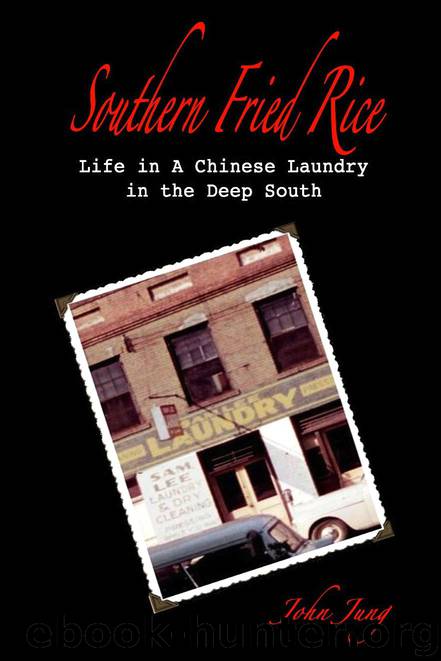Southern Fried Rice: Life in A Chinese Laundry in the Deep South by John Jung

Author:John Jung [Jung, John]
Language: eng
Format: mobi
Publisher: Yin and Yang Press
Published: 2010-10-17T16:00:00+00:00
6. Blacks, Whites, and Us
Historically the South was a region where whites held social power and treated racial minorities, especially blacks, unfairly and often unjustly. Gains in civil rights following the abolition of slavery were sharply curtailed in the last part of the 19th century with the passage of so-called Jim Crow laws that imposed the white advantage over blacks. These laws severely restricted opportunities for any equal status interactions between whites and blacks. In turn, these laws fostered informal conventions of racial social etiquette that demanded blacks be deferential and polite to whites whereas the opposite was not true. Thus, blacks had to address whites as ‘sir’ or ‘ma’am’ whereas whites could call blacks, ‘boy’ or ‘girl.’
From the time of Father’s first arrival in Macon as a bachelor in 1921 to 1956 when he finally left, rigid lines of racial separation between blacks and whites prevailed in a clearly segregated society. Before I was old enough to enter school, no one had to teach me about racial segregation because I could see clearly how “colored people” were treated as second-class citizens in every way imaginable even if I was too young to understand the history or reasons for the inequality.
The most widely known instance of inequality, of course, was the ‘rule’ that blacks had to ride in the “back of the bus.” Exactly where the front of the bus ended, and the back began, depended on the ratio of white and black passengers. If white passengers were standing, it was expected that blacks seated in the “back of the bus” would relinquish their seats but they could not occupy empty seats near the front of the bus.
I learned at a young age how whites had priority over blacks in getting service in stores. For example, at the meat counter in the grocery store, you had to be waited on by the butchers. Black customers had to wait at the back behind the whites rather than stand mingled together. That simply was the Southern way in that era.1 In the worse case, all whites that were in the store would expect to be waited on before any blacks would get served. A white person could defer and yield to a black person who had been waiting a long time, but that was not the norm.
In public areas such as stores, definite racial barriers gave favored status to whites. Thus, drinking fountains and toilet facilities were clearly labeled as ‘White’ and ‘Colored.’ At the train station or bus depot, there were separate waiting rooms designated for ‘White’ and ‘Colored.’ Schools and theatres were segregated. There were restaurants for whites only and others that served only blacks. Some white restaurants did have a separate door or window where blacks could order food to take out but they could not be served in the dining area. I was naïve about the really ugly side of racial hated and really did not know much about white supremacist organizations such as the Klu Klux Klan.
Download
This site does not store any files on its server. We only index and link to content provided by other sites. Please contact the content providers to delete copyright contents if any and email us, we'll remove relevant links or contents immediately.
| African-American & Black | Australian |
| Chinese | Hispanic & Latino |
| Irish | Japanese |
| Jewish | Native American & Aboriginal |
| Scandinavian |
Becoming by Michelle Obama(10020)
Beartown by Fredrik Backman(5737)
The Last Black Unicorn by Tiffany Haddish(5629)
Man's Search for Meaning by Viktor Frankl(4581)
The Book of Joy by Dalai Lama(3976)
The Five People You Meet in Heaven by Mitch Albom(3561)
In a Sunburned Country by Bill Bryson(3536)
The Choice by Edith Eva Eger(3467)
Full Circle by Michael Palin(3443)
The Mamba Mentality by Kobe Bryant(3265)
The Social Psychology of Inequality by Unknown(3018)
Imagine Me by Tahereh Mafi(2938)
Book of Life by Deborah Harkness(2931)
The Checklist Manifesto by Atul Gawande(2846)
Less by Andrew Sean Greer(2688)
A Burst of Light by Audre Lorde(2597)
The Big Twitch by Sean Dooley(2431)
No Room for Small Dreams by Shimon Peres(2365)
Everest the Cruel Way by Joe Tasker(2338)
